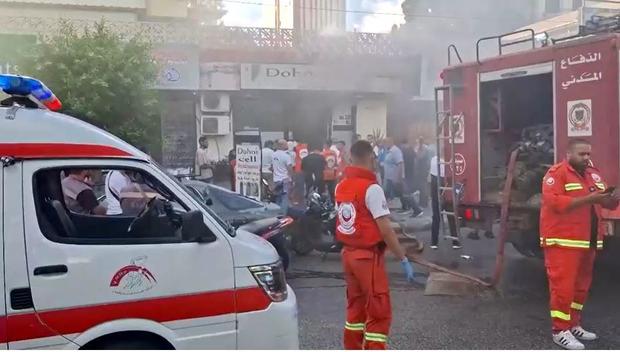
More deadly device explosions reported in Lebanon day after Hezbollah pagers explode
Beirut, Lebanon — A source close to Lebanon’s Hezbollah group told the French news agency AFP that walkie-talkies used by group members exploded in its Beirut stronghold Wednesday, with state media reporting similar blasts of pagers and “devices” in east and south Lebanon. Lebanon’s Health Ministry says 20 people were killed and 450 wounded in the explosions.
The explosions came a day after thousands of pagers carried by Hezbollah members exploded nearly simultaneously, killing at least 12 people, including two children, according to Lebanon’s public health minister. The apparently complex attacks come after weeks of rising tension between Israel and Iran-backed Hezbollah, which have exchanged fire across Israel’s northern border since the Oct. 7 attack by Hamas that sparked the ongoing war in Gaza.
At least one explosion struck Wednesday near a funeral being held by Hezbollah for some of the people killed the previous day by the pager blasts. A Reuters reporter in Beirut’s southern suburbs, a stronghold of Hezbollah, said he saw people from families with Hezbollah members quickly removing batteries from walkie-talkies that hadn’t exploded and discarding the devices.
Reuters
Lebanon’s state-run National News Agency also said pagers and devices had also exploded in Hezbollah strongholds in the east and south, with AFP correspondents also reporting explosions.
pagers that exploded Tuesday, but it said the devices carried by Hezbollah members were manufactured and sold by Bac Consulting KFT — a company based in Budapest, Hungary.
Gold Apollo founder and CEO Hsu Ching-kuang told NPR Wednesday that “there was nothing in those devices that we had manufactured or exported to them [BAC].”
CBS News has asked Bac Consulting where and how its devices are manufactured and sold, but has not received any reply either over the phone or via email.
Responding to CBS News in a text message, Hungarian Prime Minister Viktor Orban’s spokesperson Zoltán Kovács said the Hungarian leader’s office had “no knowledge/info on the matter.”
In a social media post later Wednesday, Kovács described Bac Consulting as “a trading intermediary, with no manufacturing or operational site in Hungary,” adding that the company “has one manager registered at its declared address, and the referenced devices have never been in Hungary.”
Hezbollah vows revenge after exploding pagers kill at least 12, injure thousands in Lebanon
02:58
It remains unclear exactly how many pagers blew up on Tuesday, but a senior Lebanese security official and another source told the Reuters news agency that Israel’s Mossad intelligence agency had planted a small amount of explosives inside 5,000 devices, which it said were ordered by Hezbollah just months before the blasts.
The AP and the New York Times, citing unnamed U.S. officials, also said the pagers detonated Tuesday had small amounts of explosives inside them, along with embedded switches that could be detonated remotely.
The Times said the devices carried as little as one to two ounces of explosives, embedded next to their batteries. Citing Lebanese officials, the newspaper said the affected pagers received a message at 3:30 p.m. local time that appeared to have come from Hezbollah leadership, but which activated the explosives.
Margaret Brennan,
,
Tucker Reals,
,
,
Charlie D’Agata and
Eleanor Watson
contributed to this report.
More
More
Source: cbsnews.com